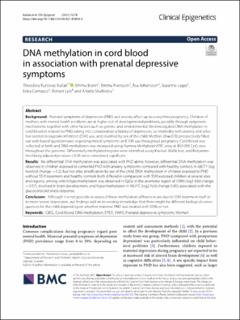| dc.description.abstract | Abstract Background: Prenatal symptoms of depression (PND) and anxiety afect up to every third pregnancy. Children of mothers with mental health problems are at higher risk of developmental problems, possibly through epigenetic mechanisms together with other factors such as genetic and environmental. We investigated DNA methylation in cord blood in relation to PND, taking into consideration a history of depression, co-morbidity with anxiety and selective serotonin reuptake inhibitors (SSRI) use, and stratifed by sex of the child. Mothers (N=373) prospectively flled out web-based questionnaires regarding mood symptoms and SSRI use throughout pregnancy. Cord blood was collected at birth and DNA methylation was measured using Illumina MethylationEPIC array at 850 000 CpG sites throughout the genome. Diferentially methylated regions were identifed using Kruskal–Wallis test, and BenjaminiHochberg adjusted p-values<0.05 were considered signifcant. Results: No diferential DNA methylation was associated with PND alone; however, diferential DNA methylation was observed in children exposed to comorbid PND with anxiety symptoms compared with healthy controls in ABCF1 (log twofold change −0.2), but not after stratifcation by sex of the child. DNA methylation in children exposed to PND without SSRI treatment and healthy controls both difered in comparison with SSRI exposed children at several sites and regions, among which hypomethylation was observed in CpGs in the promoter region of CRBN (log2 fold change −0.57), involved in brain development, and hypermethylation in MDFIC (log2 fold change 0.45), associated with the glucocorticoid stress response. Conclusion: Although it is not possible to assess if these methylation diferences are due to SSRI treatment itself or to more severe depression, our fndings add on to existing knowledge that there might be diferent biological consequences for the child depending on whether maternal PND was treated with SSRIs or not. Keywords: CBCL, Cord blood, DNA methylation, EPDS, EWAS, Prenatal depressive symptoms, Women | |
